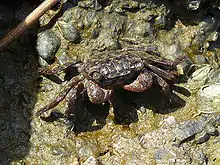Parasesarma pictum
Parasesarma pictum is a mudflat crab, belonging to the Sesarmidae family (subfamily Sesarminae), which is endemic to East Asia. This crab typically inhabits mangrove swamps, preferring the upper intertidal region of estuaries, and living in small crevices and abandoned holes made by other species.[1][2] It eats leaf litter and other vegetation. The breeding season of P. pictum is between May and September.[2]
| Parasesarma pictum | |
|---|---|
 | |
| Scientific classification | |
| Kingdom: | |
| Phylum: | |
| Subphylum: | |
| Class: | |
| Order: | |
| Infraorder: | |
| Family: | |
| Genus: | Parasesarma |
| Species: | P. pictum |
| Binomial name | |
| Parasesarma pictum (De Haan, 1833) | |
Like other sesarmid crabs, P. pictum has a square carapace. Its chelae are covered with scaly tubercles that wear down as the crab ages, and some short setae (hairs). The inside of the claw of the crab is smooth, although many ridges and fine granules are present on the movable portion; these ridges and granules are smaller in female and juvenile crabs than in adult males. The top portion (merus) of the walking legs of this crab are broad relative to the lower limb.[3]
References
- P. L. Mfilinge & M. Tsuchiya (2008). "Effect of temperature on leaf litter consumption by grapsid crabs in a subtropical mangrove (Okinawa, Japan)". Journal of Sea Research. 59 (1–2): 94–102. doi:10.1016/j.seares.2007.07.004.
- K. K. Pillay & Y. Ono (1978). "The breeding cycles of two species of grapsid crabs (Crustacea: Decapoda) from the North Coast of Kyushu, Japan". Marine Biology. 45 (3): 237–248. doi:10.1007/BF00390606.
- K. Sakai. "Parasesarma pictum". Crabs of Japan. Marine Species Identification Portal. Retrieved 19 January 2012.
External links
 Media related to Parasesarma pictum at Wikimedia Commons
Media related to Parasesarma pictum at Wikimedia Commons